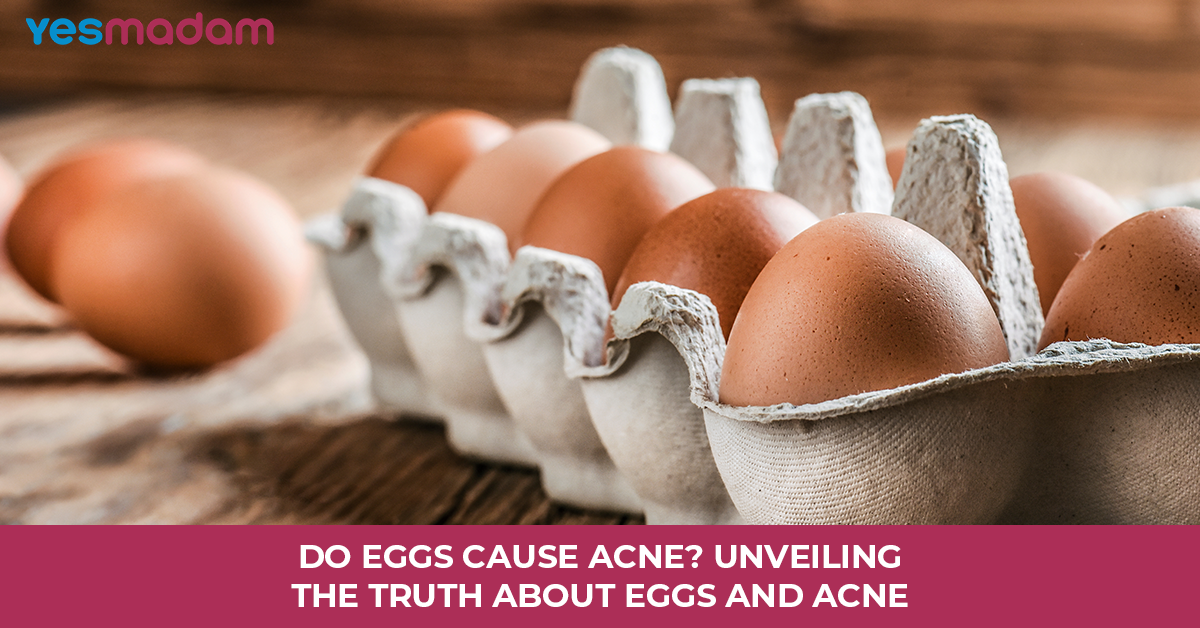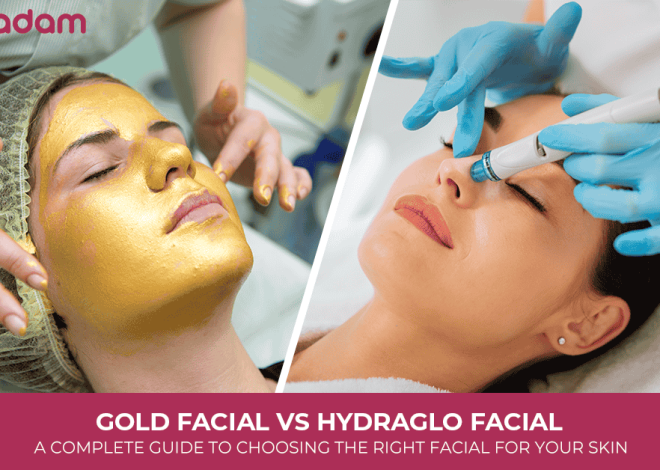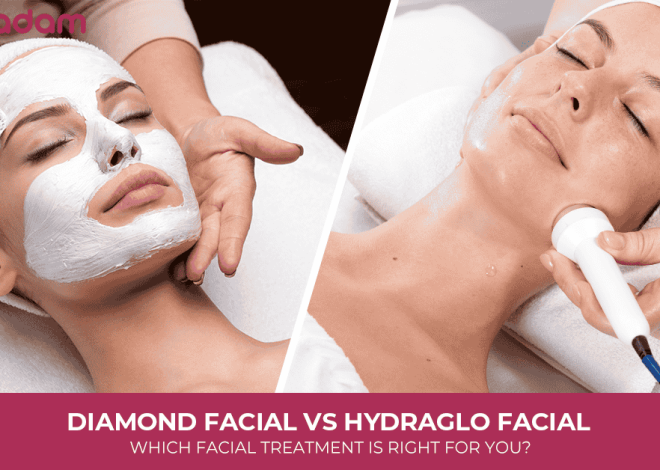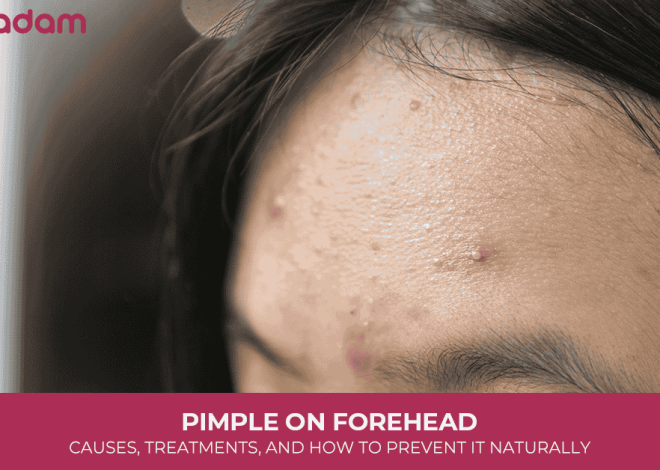
Do Eggs Cause Acne? Unveiling The Truth About Eggs and Acne
Eggs are a nutrient-dense food loved by people across the globe. But there is a rumour that’s floating around about eggs causing acne.
The real question is, does this rumour hold any truth or significance? Is it merely a rumour?
Read on the blog to get the answer to this burning question: Do eggs cause acne?
The blog aims to provide a comprehensive overview of the potential link between eggs and acne through scientific research backed by evidence, various viewpoints, separating facts from fiction, and helping readers make informed decisions about their skincare routines and dietary choices.
Table of Contents
Step-by-Step Guide on Factors That May Trigger Acne Breakouts

Before we address the question of: Do eggs cause acne? Let’s explore the causes of acne first to know if diet is a factor in triggering skin issues.
1. Too much sebum production
In acne, the natural balance of lipid molecules changes, causing the skin to produce more sebum. These changes may lead to the development of acne.
2. Internal factors
Internal shifts in the body, during the teen years, at a certain point of the menstrual cycle, during pregnancy or menopause, or due to stress, may cause an increase in sebum production and acne spots.
3. Aggressive skincare products
Using harsh exfoliants or cleansers too often can potentially damage the skin barrier and may exacerbate the acne condition.
4. Diet and lifestyle factors
Research has shown a connection between lifestyle habits and acne. Like
- Some kinds of food: There is a link between foods with high sugar content and acne.
- Lack of sleep: Poor sleep causes excess sebum production and increases the likelihood of developing acne.
- High stress levels: Psychological stress has been linked to increased sebum production, disrupted skin barrier, and increased inflammation. all of which may make existing acne worse.
5. Skin Type
Certain skin types, like oily skin, tend to produce more sebum than other skin types and thus, more prone to acne breakouts.
Does Eating Eggs Cause Acne? Here’s What The Science Says
Opinions are widely divided on: can eggs cause acne. We will try to answer this question through three main science and research-backed factors.
1. Understanding the nutritional aspects of eggs in relation to acne
Eggs are a powerhouse of essential nutrients. So, when it comes to assessing the connection between the nutritional profile of eggs and acne development, the answer to does eating eggs cause acne leans towards yes. Here are the acne-triggering nutrients in eggs:
- Biotin in eggs: Eggs are a rich source of biotin. As per research, excess biotin intake may result in keratin production and may cause an acne breakout.
- Iodine content: Each egg contains about 27 mcg of iodine, triggering a fluoride purge. Iodine in eggs indirectly triggers acne in the process of flushing out fluoride from your body, which is the worst acne trigger and a toxic mineral that does not leave your body easily.
- Excessive progesterone: Eggs are full of progesterone, which is an acne-triggering hormone.
- Albumin content: Albumin is a protein found in egg whites, and when these proteins are not broken down, they may clog up the lymphatic drainage. This may lead to inflammation on the face, ultimately leading to acne.
2. Debunking myths on the egg-acne nexus
Let’s shed some light on the intricate debate on: can eggs cause acne through separating the facts from fiction, as highlighted below:
- Cholesterol conundrum: Research suggests that dietary cholesterol has minimal influence on blood cholesterol in most individuals. Thus, concerns over acne-induced cholesterol vis-à-vis egg consumption may be overstated.
- The glycemic index factor: Glycemic Index (GI ) foods may potentially exacerbate acne through triggering an insulin response. Eggs have a low GI, indicating that they are less likely to spike insulin levels.
- Hormonal impacts: The amount of androgens, hormones that may influence acne development, is significantly lower in eggs, thereby supporting the viewpoint that eating eggs is less likely to cause hormonal shifts that may cause acne.
3. Do eggs cause acne? Closing the case
No , eating eggs does not directly cause acne for most people. But some individuals may notice that some foods, including eggs, may worsen their acne, probably due to things such as:
- Individual variances: Personal sensitivities or allergies to the same foods totally differ from person to person. As our bodies react differently due to genetic factors and unique sensitivities.
- Genetic predispositions: Genetic predispositions play a key role in determining the impact of egg consumption on acne. Individuals with a genetic tendency towards heightened sensitivity to some foods, including eggs, may experience acne breakouts, while others may remain unaffected.
- The role of protein: One’s personal reaction to egg proteins like albumin can vary, and what may benefit one may be detrimental to another, as acne-inciting agents.
More Information For You: CO2 Laser Treatment
How to Know if Eggs Are Causing Acne?

To know if eggs cause acne, conduct a controlled elimination diet: first, completely stop eating eggs for at least a month to let your skin heal, then slowly reintroduce them while tracking your skin’s reaction to identify your personal trigger threshold.
Steps to Determine if Eggs Are Causing Your Acne
- Elimination Period:
- Stop consuming eggs and any foods containing eggs for a period of four weeks to allow your skin to heal.
- Monitor your skin for any improvement in acne during this time.
- Reintroduction & Observation:
- Slowly reintroduce eggs: into your diet, starting with a small amount, like one egg, once or twice a week.
- Keep a food diary: to track what you eat and when, noting any changes in your skin’s appearance.
- Watch for symptoms: If eggs are a trigger, you may notice acne flare-ups or symptoms like inflammation within two to three days of consumption.
- Consult a Professional:
- If you’ve completed the elimination and reintroduction process and still have concerns, consult a dermatologist or healthcare professional.
- They can help determine if eggs are a trigger or if other factors are contributing to your acne.
Important Considerations
- Patience is key: Give your skin time to heal and for the effects of the elimination to become clear.
- Individual threshold: Everyone’s reaction is different; some people may be able to consume a small amount of eggs without issue, while others may be more sensitive.
- Other triggers: If your acne persists after eliminating eggs, other dietary factors, or factors like hormonal changes may be the cause.
Don’t Miss: Ice Roller for Face Benefits
Additional Precautions To Take If Eggs Cause Acne
Now that you know a bit about how to check if eggs are causing acne, and preventive steps to take. Here’s more on what precautions to take if eggs cause acne:
- Limit intake of eggs: Limit your consumption of eggs to 2-3 times a week to minimize acne flare-ups and monitor how your skin responds.
- Cook eggs properly: Always cook eggs thoroughly, as uncooked or raw eggs may at times worsen acne due to difficult-to-digest proteins or bacteria.
- Go to the gym or for a run: If eating eggs daily, ensure that you sweat it out at the gym or go for a run to help keep your skin clean, as exercising helps flush toxins from your body and minimizes the chances of acne breakouts.
- Personalized dietary approach: Maintaining a personalized food diary helps you understand your body’s unique response to different foods, including eggs, and adjust your diet accordingly.
- Opt for boiled eggs: Do not fry eggs in too much butter or oil, as excess grease may worsen oily and acne-prone skin. Eat boiled eggs to prevent breakouts.
- Consider substitutes: If eggs are contributing to your acne, consider substitutes like cheese, tofu, paneer, flaxseeds, chickpeas, etc, to get valuable nutrients without the drawbacks associated with eggs.
Conclusion
Therefore, the clear answer to: Do eggs cause acne? is not a simple yes or no. As there is no proven evidence to suggest that eggs directly cause acne, individual dietary responses may differ. Moreover, acne triggers are highly personal and often relate to genetics, instead of specific foods. To conclude, whether you enjoy eating eggs or not, adopting a holistic skincare approach that includes a proper skincare routine, a healthy diet, and expert advice is the best way to manage diet-related acne triggers and to maintain vibrant and clear skin.
FAQs
Does eating egg cause pimples?
Yes, egg causes pimples in some people due to the progesterone and high biotin content in eggs, which can disrupt hormone levels and interfere with Vitamin B5 absorption.
How does egg cause pimples?
Eggs may cause pimples in some people because their high levels of progesterone can trigger oil glands, while biotin can increase oil production and block pores, and undigested albumin protein may cause inflammation.
Does egg white cause acne?
Yes, Egg white may cause acne in some sensitive individuals, either due to an intolerance to the albumin protein leading to inflammation, or because the high biotin content in eggs can interfere with other B-vitamins like vitamin B5, which helps regulate skin oil.
Should I stop eating eggs completely if I have acne?
Not necessarily. Unless you notice a clear link between your egg consumption and breakouts, there’s no need to avoid them entirely. Moderation is key — limit intake to a few times a week and choose healthier cooking methods like boiling or poaching.
Are egg whites or yolks more likely to cause acne?
Egg whites are more commonly linked to acne because of a protein called albumin, which may irritate the skin or increase oil production in acne-prone individuals. However, yolks contain hormones and fats that can also contribute to breakouts in some cases.
Can eggs worsen hormonal acne?
Yes, for some individuals, eggs can worsen hormonal acne because they naturally contain certain hormones that might affect their own hormone levels. This is more likely if you already have hormone-related skin issues.
Is it safe to apply egg to the face if I have acne-prone skin?
It’s best to avoid applying raw egg masks on acne-prone skin. Raw eggs can carry bacteria (like Salmonella) and may clog pores or irritate sensitive skin. Instead, opt for natural anti-acne ingredients like honey, aloe vera, or green tea.
Do eggs affect oily skin types differently?
People with oily skin are more prone to acne, so if eggs increase sebum production or inflammation for you, breakouts may be more frequent. Monitoring your diet and keeping a balanced skincare routine is essential.
Can I still get clear skin while eating eggs?
Yes! Many people with acne eat eggs without issues. The key is balance — combine eggs with a clean diet rich in vegetables, whole grains, and antioxidants, and follow a consistent skincare routine.
Why do eggs cause acne in some people?
Eggs may cause acne because they can increase inflammation in certain individuals or trigger hormonal imbalances. Additionally, biotin (vitamin B7) in eggs, when consumed in excess, can interfere with vitamin B5 absorption, which may lead to clogged pores and breakouts.



